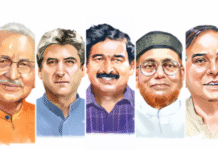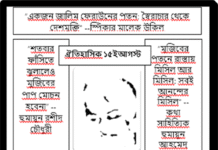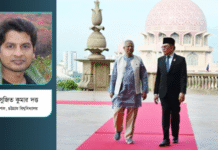TBS
Over the past year, obtaining a visa has become markedly harder for Bangladeshi nationals. And for many who finally secure one, the ordeal does not end at the embassy

Mahfuz, a frequent traveller who had visited Thailand twice before, sensed something was different during his third visit in May this year. At the immigration counter, the officer slowly flipped through his Bangladeshi passport before saying, “Please, step aside.”
For nearly an hour, he sat in a cramped waiting area with a few other Bangladeshis from the same Biman flight, while passengers from other countries breezed past. When his turn came, the questions felt more like an interrogation: Why was he travelling alone? Where would he stay? How much cash did he have? And why was his debit card not endorsed for more than $500?
“Even though I showed them my return ticket and paid hotel booking for the first few days, they kept looking at me with suspicion,” Mahfuz recalled. “They asked why I hadn’t booked hotels for the rest of the trip. I explained I wasn’t sure where I’d go after Bangkok, but they weren’t satisfied.”
In the end, immigration officers made him complete paid hotel bookings for all nine days of his stay in the country before letting him go. “It was harassment beyond description. I felt humiliated, like a criminal in front of other travellers. I had to make hotel bookings in a hurry, many of which I couldn’t even use — and it was too late to get refunds,” he said.
Mahfuz’s incident is far from an isolated one.
Over the past year, obtaining a visa has become markedly harder for Bangladeshi nationals — especially for those travelling to countries across Southeast Asia, the Gulf, Eastern Europe, and even India. And for many who finally secure one, the ordeal does not end at the embassy.
At foreign immigration checkpoints, many face intense screening and questioning that often lead to entry refusals or offloading — sometimes even after initial passport control — leaving them humiliated, out of pocket, and reliant on airlines to arrange their return.
The pattern shows that a visa is only one step: nationality can still trigger extra, often arbitrary, checks at foreign airports.
For example, Farzana, a 26-year-old NGO worker, was travelling abroad for the first time to attend a week-long conference in Colombo with some of her other co-workers. At Colombo immigration, the officer asked, “Will you work during your stay?” Believing he was referring to her conference, she replied, “Yes.”
That’s when the trouble began.
The officer misunderstood, assuming she was seeking employment in Colombo, and his tone immediately grew cautious. Though Farzana quickly tried to make things clear, the immigration officer kept asking whether she had an invitation letter, what her NGO did, why she had been chosen for the trip, and who would cover her accommodation and meal expenses during the conference.
She presented all the documents and explained her role, yet the officer’s suspicion lingered. It was only when her colleagues from the same organisation, bound for the same event, arrived that she finally felt a sense of relief.
“By the time I was cleared, the excitement of my first trip had faded,” Farzana recalled. “I think they were intentionally trying to trip me up because I hold a Bangladeshi passport — I didn’t see them treat other nationals the same way.”
She added, “I was lucky I could explain myself in English. For some other Bangladeshis with weaker English skills, the hassle dragged on much longer.”
Then there is Reza, a Bangladeshi expat who has lived in the Middle East for over five years. Recently, while returning to his city of residence after a trip to Bangladesh, he was stopped at immigration and subjected to intense questioning.
“The officers grilled me about my job, salary and family situation,” Reza said. “Even with valid residency papers and years of living here, they treated me like a first-time visitor, suspicious simply because I hold a Bangladeshi passport.”
While Reza was at least able to enter his destination despite the challenge, many Bangladeshi expatriates and tourists face harsher outcomes.
Most recently on 13 August, Malaysian authorities denied entry to 204 Bangladeshis at Kuala Lumpur International Airport for vague travel reasons and inconsistent documents. This follows earlier mass deportations of 96 on 11 July, 123 on 24 July, 80 on 25 July, and 26 on 7 August — all over similar allegations.
Dr Mohammad Jalal Uddin Sikder, a labour migration and mobility specialist, said the recent harassment of Bangladeshis at foreign immigration checkpoints is partly linked to extra precautionary measures in countries like the UAE, Malaysia and Turkey.
“The case in Malaysia is a special one,” he explained. “Recently, some Bangladeshis there were arrested on suspicion of involvement in terrorist activities. We are still not certain whether they were Malaysian nationals of Bangladeshi origin or Bangladeshi workers. If the former, the responsibility falls on the Malaysian government. But still, Bangladesh’s image has been tarnished, as if it only sends terrorists to Malaysia.”
He added that beyond this, the regime change in Bangladesh following a mass uprising has led many criminals to attempt to flee abroad under false identities, prompting tighter scrutiny of Bangladeshi travellers.
Meanwhile, Bangladesh Outbound Tour Operators Forum (BOTOF) President Chowdhury Hasanuzzaman Rony said that harassment and deportations of Bangladeshis at foreign immigration are not new. “In the past, many countries had open visa policies for us, so the proportion of such cases may have been lower. Now, with most destinations closed, the few countries still accessible are witnessing these incidents more frequently — making them far more visible,” he said.
He linked the problem to human trafficking and the trend of seeking illegal employment abroad. This negative reputation, he explained, means even genuine tourists are facing difficulties. Traffickers often send Bangladeshis overseas on tourist visas, and since foreign immigration police are aware of the tactic, they now impose extra scrutiny on Bangladeshi travellers. The main culprits, he stressed, are dishonest agencies that mislead people and send them abroad under false pretences.
“Genuine tourists usually have the necessary documents and cash, and know their destinations and accommodation. But many posing as tourists have no such idea. As a result, every Bangladeshi is now viewed with suspicion,” Rony said.
But he also mentioned that even among legal migrants and tourists, awareness is often lacking. Agencies misguide them, encourage the use of fake documents, and the government does little to raise awareness. “Unless this changes, Bangladeshis will continue to face harassment abroad,” he warned.
Shariful Hasan, associate director of BRAC’s Migration Programme and Youth Platform, warned that while illegal migration plays a role, Bangladesh’s image abroad has taken a severe hit over the past year due to “rising mob violence, targeted killings, and a general deterioration of law and order”.
As a result, even those with valid US or European visas are “repeatedly stopped and checked simply because they hold a Bangladeshi passport”.
He also pointed to irresponsible behaviour by some Bangladeshis — entering on tourist visas and visiting restricted areas, travelling without proper documentation — as further damaging the country’s standing.
“You see, Bangladesh now ranks first among all nationalities attempting to cross the Mediterranean illegally, and some nationals have gone to fight in the Russia–Ukraine war. So, foreigners have little reason to trust Bangladeshis,” Hasan said, adding that only improvements in governance, the economy, and political stability could change this.
He mentioned that hopes that the interim government and the global reputation of Chief Adviser Dr Muhammad Yunus would ease travel have been dashed. “The situation is now worse than before,” he said.
Dr Sikder added that restoring democracy was essential to repairing Bangladesh’s image. “If a fair election can be held and international observers are left with a good impression, only then will Bangladesh be able to recover,” he said, noting that unelected governments fare poorly in global indices — and their citizens pay the price abroad.
Disclaimer: Some names have been changed to protect identities.









